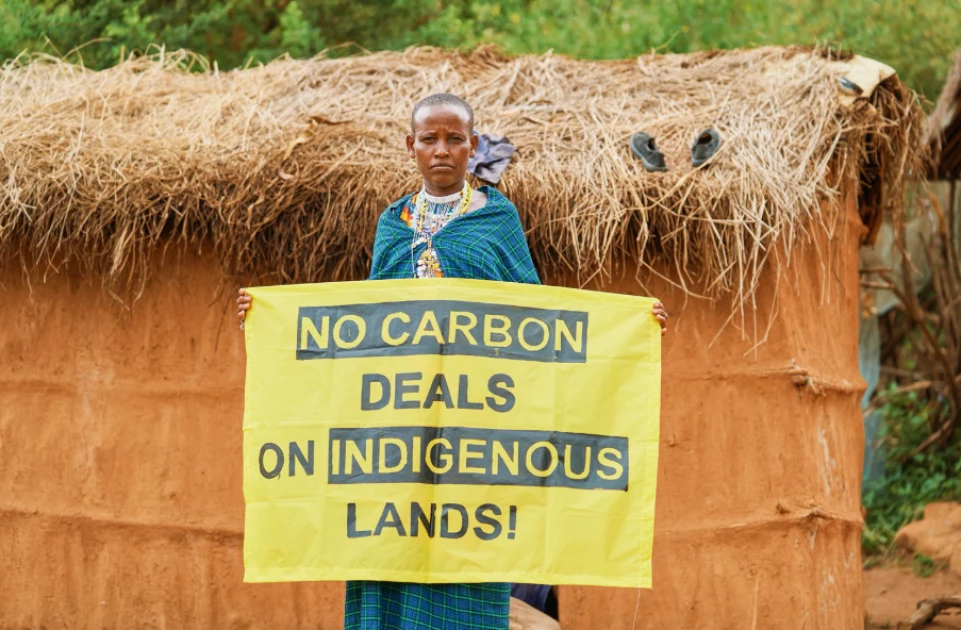Kajiado community fights back against carbon offset land grabs


Audio By Vocalize
The Oldonyonyokie Community Group Ranch in Kajiado County in
Kenya, in a bold act of resistance, has pushed back against the wave of land
acquisition by organizations in the name climate action.
In the latest turn of events, the community turned against
carbon offset projects which they believe threaten to displace indigenous people
and undermine centuries-old land rights.
The move has sparked conversations on just how legitimate the carbon
credit deals are. Civil society organizations in Kenya have lauded the
Oldonyonyokie Community and called upon others to stay put and not allow carbon
credit trading on indigenous land.
Greenpeace Africa, in a press release on the matter, claimed
that at the center of the growing controversy are carbon market schemes
promoted by foreign companies, citing Carbon Solve, Soil for the Future Africa,
and Soil for the Future Tanzania.
They accuse the said entities of targeting community lands in
Kajiado for carbon offsetting, continuing a trend believed to have already
devastated communities across Kenyan border, in Tanzania.
“In Tanzania’s Ngorongoro, Loliondo, Longido and Monduli, the
Maasai are being violently evicted from their ancestral lands to make way for
similar schemes,” reads part of the statement.
According to Amos Wemanya, Responsive Campaign Lead at
Greenpeace Africa, carbon market trading is climate colonialism.
“Communities that have lived in harmony with nature for
generations are being pushed off their land so that foreign polluters can
continue business as usual. Carbon offsetting is not a climate solution, it is
a dangerous distraction that sells off our future,” stated Mr. Wemanya.
Climate justice crusaders emphasize that rather than reducing
global emissions, carbon markets allow corporations, largely based in the
Global North, to “offset” pollution through land grabs in the Global South,
schemes which put a price tag on nature and make African communities bear the
burden of a crisis they did not create, while enriching foreign middlemen and
questionable local entities.
It is not the first time that the people of Oldonyonyokie have
encountered attempts to disrupt their harmony and community unity. According to
the community elders, they still carry a long memory of the case of Tata
Chemicals Magadi Limited which was granted an initial 99-year lease on
community land in 1928, and later received a 40-year extension in 2004.
The lease, which involved over 224,000 acres, according to
them was the source of tension, with local communities raising concerns about
inadequate consultation and limited benefits to the residents.
Greenpeace Africa further revealed that high ranking
individuals are being used by the Kenyan national government to facilitate the
leasing and selling of land to private entities, without transparent community
consultation or consent. A move that, they say, undermines democratic processes
and violates the rights of Kenyans.
The Civil Society Organization has as such called on Soil for
the Future Africa and similar actors to immediately halt further attempts to
force or impose projects on communities citing respect for indigenous people.
The protests come a few months after yet another carbon credits
trade targeting two conservancies suffered a blow in Northern Kenya after a
Kenyan court halted a major carbon credit project by Northern Rangelands Trust
(NRT) on the basis of a breach on indigenous community rights.
In Kenya, land carbon offset narratives presented as climate
action faces harsh criticism as it is viewed as a scum and a cunning way for
rich people through organizations to illegally acquire vast of land from
unsuspecting indigenous communities.


Leave a Comment